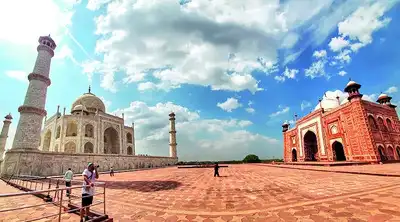New Delhi: Senior advocate Kapil Sibal on Monday urged the Supreme Court to stay the implementation of the Waqf Amendment Act, 2025, arguing that the law was designed to expropriate Muslim waqf properties and strip the community of its religious rights, reported the Times of India.
Appearing before a bench comprising Chief Justice of India D.Y. Chandrachud and Justice Augustine G. Masih, Sibal asserted that the new law allowed the government to de-recognise unregistered waqf properties, including those recognised through waqf by user, and to exclude ancient monuments such as the Taj Mahal and Jama Masjid in Sambhal from the ambit of waqf.
Leading a team of senior advocates representing the Muslim side, Sibal claimed the law was “framed and designed for wholesale capture of waqf properties through a legislative fiat, in a process that is non-judicial and purely executive.”
When the CJI observed that courts prima facie presume a law enacted by Parliament to be valid, Sibal countered that the Act was discriminatory and targeted Muslims by mandating that a waqif must be a practising Muslim for five years to be eligible to donate property for waqf purposes.
“Has any other religious denomination been mandated by law to ask the same question to anyone making an endowment for charitable purposes?” Sibal asked.
He also highlighted that while waqf laws require only Muslims to be part of the Central Waqf Council and state Waqf Boards, the new amendment allows the government to nominate non-Muslims, who can even form a majority in these bodies. “No religious endowment of Hindus, Sikhs or Christians allows a non-believer in that religious faith to be a member of their endowment administrative body,” he stated.
Sibal further said that this encroachment violates the rights guaranteed to Muslims under Articles 25 and 26 of the Constitution, which ensure freedom of religion and management of religious affairs, and also breaches Article 15, which prohibits discrimination on the basis of religion.
Calling the law “ex facie unconstitutional,” Sibal demanded that its operation be stayed until the Supreme Court fully examines its constitutional validity.
He also noted that earlier laws like the Ancient Monuments Preservation Act of 1904 and its updated version in 1958 protected the religious character of waqf properties taken over for preservation. But the present law entirely bars ancient monuments from being declared waqf properties.
Further raising concerns, Sibal said that disputes over waqf land claimed by the government would now be decided by a government-appointed officer. Based on that officer’s report, changes would be made to revenue records—without any judicial process. “The government becomes a judge in its own cause,” he remarked.
Supporting Sibal’s arguments, senior advocates Rajeev Dhavan and A.M. Singhvi referred to the 2019 Ayodhya verdict, asserting that the Supreme Court had upheld the Places of Worship Act, 1991, and the Waqf Amendment Act could not override either the law or the five-judge constitutional bench ruling.
Responding to the CJI’s comment on the presumption of constitutionality, Singhvi said, “Even the three farm laws of 2019 were stayed by the Supreme Court,” emphasising the need for similar judicial intervention in this case.




